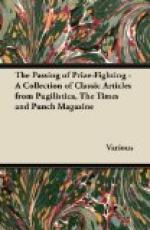Wretched as we must be at this reflection, we generously resort to—our scissors, and publish our own discomfiture.
In alluding to the author’s description of the London dining-room, the John Bull remarks:—
It will bring comfort to the savage bosoms of the late Ministry, for whose especial information we must make a few more extracts, concerning coffee-houses, or shops, as they are mostly termed.
COFFEE SHOPS.
The second class of coffee-houses, and those I have particularly in my eye, are altogether different from those I have just mentioned. The prices are remarkably moderate in most of these places; the charge is no more than three-halfpence for half a pint of coffee, or threepence for a whole pint. The price of half a pint of tea is twopence, of a whole pint fourpence. If you simply ask bread to your tea or coffee, two large slices, well buttered, are brought you, for which you are charged twopence. Or should you prefer having a penny roll, or any other sort of bread, you can have it at the same price as at the baker’s.
In most coffee-houses, you may also have chops or steaks for dinner. If the party be a rigid economist(!) he may, as regards some of these establishments, purchase his steak or chop himself, and it will be prepared gratuitously for him; but if that be too much trouble for him to take, and he prefers ordering it at once, he will get, in many houses, his chop with bread and potatoes with it for sixpence, and his steak for ninepence or tenpence.
These coffee-houses have many advantages over hotels, besides the great difference in the prices charged. In the first place, there is not so much formality or affected dignity about them, and they are far better provided with means of rational amusement; and the promptitude with which a customer is served is really surprising.
Are not these passages declarations of the individual? Winding himself up with twopenny-worth of cheese! Pleading for the additional penny for the waitress, whose personal charms and obliging disposition must be considered to extort the amount! And above all, unable to conceive any motive, except aversion to trouble, for disliking to carry “his chop” upon a skewer through the streets of London. How every line revels in the recollection of having dined, and speaks how seldom! while the well-buttered bread infers the usual fare. Still it is not meanly written. There are a glorying and exultation in every word that redeem it, and show the author is more to be envied than compassionated; though a little further on we perceive the shifts to which his homeless state has reduced him.
MEDITATION IN LONDON.
You can order, if you please, a cup of coffee without anything to it; and, for so doing, you may sit if you wish for five or six hours in succession.
I have said that coffee-houses are excellent places for reading; I might have added, for meditation also. For unlike public-houses, there are no noisy discussions and disputes in them. All is calm, tranquil, and comfortable. The beverage, too, which is drank as a beverage, as I before remarked in a previous chapter, cheers, but not inebriates.




